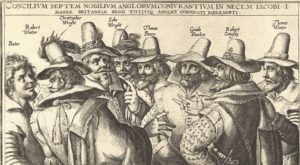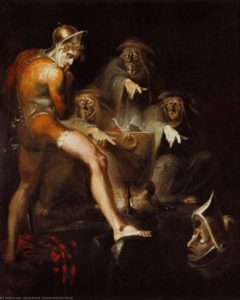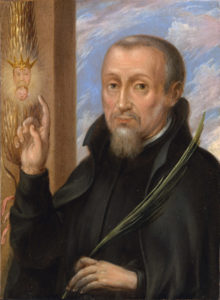
It wasn’t until recently that I discovered the link between Shakespeare’s famous play and the event that nearly shook England’s ruling class to its knees. The Gunpowder Plot was a carefully planned event with thirty-six barrels of gunpowder stashed under the House of Lords in order to blow King James and his government sky-high. Most fortunately—as the story goes—it was foiled by a last-minute letter to Lord Monteagle warning him not to attend Parliament the next day. A timely search of the basement exposed Guy Fawkes and his stockpile before he had the opportunity to apply the fuse. England celebrated its miraculous escape from disaster, and the king’s men went after the conspiracy with a vengeance.
What did this have to do with Shakespeare? Well, as it turns out, Warwickshire was a hotbed of conspirators, and some properties near Stratford-Upon-Avon had been leased to provide a meeting house for the plotters. Worse than that, the town was full of closet Catholics known as recusants—and Shakespeare may have been one of them. A search of the properties in question revealed a hoard of forbidden Catholic paraphernalia—or “massing relics”, as they were called. William Shakespeare, unfortunately, was distantly related to some of the plotters themselves and had business relationships with others. Talk about guilt by association!

Since we know next to nothing about Shakespeare, we can only speculate about his motivations. But I suspect appeasing the king might have been on his mind. Not so coincidentally, less than a year after the gunpowder plot we see the first performance of Macbeth, demonstrating the consequences of killing a king. Shakespeare also gives a nod to James’s lineage—Banquo was recognized as the ancestor to the Stewarts—as well as a reference to witches—a theme close to the monarch’s heart. It was commonly thought that diabolical agents were responsible for the most evil of human activities.
But that’s not all. Renowned Shakespearean historian James Shapiro tells us that a discovery during the gunpowder plot investigation introduced a new word to the English lexicon: equivocation. Actually, the word wasn’t new; it was just redefined and “had become a byword that transfixed the nation and suffused the play he was writing”.1 The government badly needed a scapegoat—a leader—and they found him in the guise of Jesuit Superior Henry Garnet, who had written a treatise advising Catholics how to lie under oath during interrogation, while seeming to tell the truth. It was a play on words extraordinaire.
A diligent search of the Inner Temple in London had uncovered this amazing manuscript, with a crossed-out title: “A Treatise of Equivocation” which had been changed to “A Treatise of Lying and Fraudulent Equivocation”. Here, too, the word “of” was crossed out and changed to “against”, but no one was fooled; the authorities had, in their hands, a how-to guide for evading prosecution. For example, “You could deny that you were harboring a priest by saying that the priest ‘lyeth not in my house,’ since he wasn’t telling lies there.”2

Whether the treatise had anything to do with the gunpowder plot was irrelevant; Garnet apparently knew about the conspiracy and kept silent. This was good enough, and so much better than prosecuting a handful of disgruntled Catholic gentry. Now the detested fingers of the Jesuits were all over the plot, and the treatise took on a major role in the legal proceedings. The word equivocation had gone viral, so to speak, and a high-profile trial of Garnet himself ended in the inevitable conviction of treason.
In Macbeth, as Professor Shapiro tells us, “Equivocation permeates the play”. The witches equivocate when they tell Macbeth he shall be king—not informing him that he will need to kill in order to get the crown. And of course, later on, they equivocate, telling him he should never be vanquished ‘till Birnam Wood comes to Dunsinane. Macbeth equivocates to his wife, not telling her that Banquo’s heirs will be kings rather than his own. He equivocates when he kills the guards, then again when he hires Banquo’s murderers. Lady Macbeth equivocates when she tells the banquet guests that “my lord is often thus” after they watch him shriek at an empty chair. Even Lady McDuff equivocates, pretending to her son that his absent father is dead. But the most telling aspect of all is the porter scene, in which the word equivocate is used over and over again:
“Knock, knock! Who’s there, in th’ other devil’s name? Faith, here’s an equivocator that could swear in both the scales against either scale, who committed treason enough for God’s sake yet could not equivocate to heaven. O, come in, equivocator.”
The word is used five times by the porter and later, once by Macbeth. There’s no doubt that equivocation truly is the byword this time around, made even more interesting that it is only used once in all Shakespeare’s plays written before Macbeth.
As he often did, Shakespeare wrote his play in response to concerns pervading London society. A fear of unseen forces was very real to his contemporaries, and Macbeth would have struck a chord in the unsettled atmosphere pervading King James’s court. One wonders what the playgoers might have thought when passing underneath the severed heads of the Gunpowder Plot conspirators, while crossing London Bridge from Southwark on their way home.
1 Shapiro, James, THE YEAR OF LEAR, SHAKESPEARE IN 1606, Simon & Schuster, New York, 2015, p.156
2 ibid, p.158
Elizabeth St.John says:
Super interesting, Mercedes, thanks for joining those dots and showing us again how Shakespeare shaped and reshaped our language and amplified politics.
As an aside, I read recently that Charles II commanded Shakespeare’s Richard III be played in the summer of 1674 (when things were warming up against Catholics and Charles thought his throne was getting a little shaky), as a warning that those who seek to overthrow the rightful king will get their comeuppance.
Mercedes Rochelle says:
Well, THAT’s fascinating! Thanks for the note… I’ll have to check into that. I really like Charles II